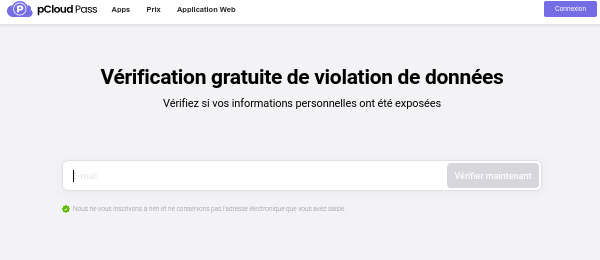
Vous n'êtes pas identifié(e).
Pages : 1

Les brèches dans lesquelles vos données ont été trouvées
Data Enrichment Exposure From
PDL Customer
In October 2019, security researchers Vinny Troia and Bob Diachenko identified an unprotected Elasticsearch server holding 1.2 billion records of personal data. The exposed data included an index indicating it was sourced from data enrichment company People Data Labs (PDL) and contained 622 million unique email addresses. The server was not owned by PDL and it's believed a customer failed to properly secure the database. Exposed information included email addresses, phone numbers, social media profiles and job history data.
Données compromises:Email addresses, Employers, Geographic locations, Job titles, Names, Phone numbers, Social media profiles
Deezer
In late 2022, the music streaming service Deezer disclosed a data breach that impacted over 240M customers. The breach dated back to a mid-2019 backup exposed by a 3rd party partner which was subsequently sold and then broadly redistributed on a popular hacking forum. Impacted data included 229M unique email addresses, IP addresses, names, usernames, genders, DoBs and the geographic location of the customer.
Données compromises:Dates of birth, Email addresses, Genders, Geographic locations, IP addresses, Names, Spoken languages, Usernames
Lumin PDF
In April 2019, the PDF management service Lumin PDF suffered a data breach. The breach wasn't publicly disclosed until September when 15.5M records of user data appeared for download on a popular hacking forum. The data had been left publicly exposed in a MongoDB instance after which Lumin PDF was allegedly been "contacted multiple times, but ignored all the queries". The exposed data included names, email addresses, genders, spoken language and either a bcrypt password hash or Google auth token. The data was provided to HIBP by a source who requested it be attributed to "JimScott.Sec@protonmail.com".
Données compromises:Auth tokens, Email addresses, Genders, Names, Passwords, Spoken languages, Usernames
Verifications.io
In February 2019, the email address validation service verifications.io suffered a data breach. Discovered by Bob Diachenko and Vinny Troia, the breach was due to the data being stored in a MongoDB instance left publicly facing without a password and resulted in 763 million unique email addresses being exposed. Many records within the data also included additional personal attributes such as names, phone numbers, IP addresses, dates of birth and genders. No passwords were included in the data. The Verifications.io website went offline during the disclosure process, although an archived copy remains viewable.
Données compromises:Dates of birth, Email addresses, Employers, Genders, Geographic locations, IP addresses, Job titles, Names, Phone numbers, Physical addresses

Hors ligne
Dernière modification par Myrddin (30-04-2023 14:27:25)

Hors ligne
Pages : 1